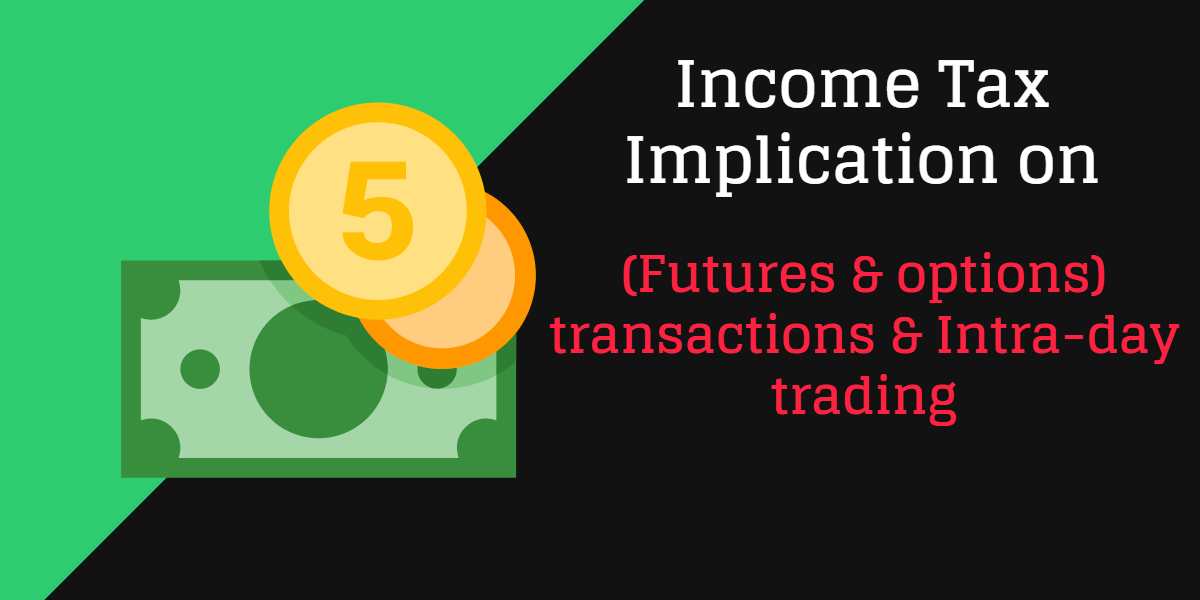This article is about how trading in derivatives(F&O) and intra-day trading is to be treated under the Income tax, i.e. the income tax implications on F&O (future & options) trading
We will briefly discuss the following:
1. Basic understanding of the concept
2. Computation of income- F&O & intra-day trading
3. Calculation of turnover- F&O
4. Set-off & Carry forward of losses
5. Applicability of tax audit
A basic understanding
Derivatives are the instruments whose value is derived from an underlying asset. Its value is based on an underlying asset. The most popular derivatives are futures and options.
Futures is a contract to buy or sale an underlying asset on a specified date at a pre-determined price. On expiry of contract, futures are executed by delivering the underlying asset or through payment.
Options is a contract same as future, except in option, one party of the contract has an option (right).
Intra-day trading deals with buying and selling of stocks on the same day, during the trading hours such that all positions are closed before the market closes for the trading day.
Now let’s understand the income tax implications on F&O
Income derived from derivatives (i.e. futures & options) as well as from Intra-day trading are classified as business income.
Further, income from business can be classified as income from speculative and non speculative business.
Speculative Business Income is the income earned from intra-day equity, stocks or currency trading
Non-speculative business Income is the income derived from trading through derivatives, both intraday and carryforward.
Income from speculative and non-speculative business are taxable at the slab rate and thus these incomes has to be added to all your other income like salary, rental income, other incomes etc.
However, Income tax act treats income from speculative & non-speculative businesses separately, when it comes to setting off & carrying forward losses.
Now, we know that tax rates on speculative or non-speculative are the same, we need to now see how the income is computed for futures & options and Intraday trading.
Computation of income- to determine income tax implications on F&O
Like a normal business, computation of income in case of F&O transactions or Intra-day trading would broadly be: Turnover – Purchases – other expenses
Further, income from F&O trading can also be computed using the presumptive scheme u/s 44AD, which essentially presumes the income to be 6% (in case of 100% electronic transactions)
Though the catch here is calculating the turnover in case of F&O transactions, so let’s see how it has to be done
Calculating turnover- F&O
Turnover in case of F&O trading is determined as follows:
- Total of favorable and unfavorable differences
- Premium received on sale of options is to be included in turnover
- In respect of any reverse trades entered, the difference thereon, form the part of the turnover
It makes no difference whether the difference is positive or negative, it is aggregated to the turnover in either way.
For instance: Mr. A bought 200 units of futures @ Rs. 4,00,000 and sold them at Rs.4,50,000 (Profit:50,000). He also bought 100 units of options @ Rs. 2,50,000 and sold it @ Rs. 1,90,000 (Loss: 60,000).
Total turnover shall be calculated as: Rs.50,000 + Rs.60,000 = Rs.1,00,000. And, if any premium is received on sale of options, it is added to the turnover.
How are income/loss from speculative & non-speculative business different
While the basic methodology of arriving at income & taxes are same in both the cases, it is their treatment in set-off & carry forward of losses, which is different.
In case of non-speculative business, losses can be set off against any head including income from speculative business but excluding income from salaries. If any such loss is not set off in the current year, then such loss can be carried forward for a period of 8 subsequent assessment years.
While, in case of speculative business, losses can only be set off against income from other speculative business in that assessment year. If any such loss is not set off in the current year, then such loss can be carried forward for a period of 4 subsequent assessment years.
Applicability of Tax Audit on F&O transactions
Tax audit for any business is required, when the turnover exceeds Rs 1 crore in a financial year.
Further, a tax payer having turnover up to 2 crores can opt for presumptive taxation scheme under Sec 44 AD. This scheme exempts the taxpayer from the tax audit (if the scheme is opted). However, this section also requires tax audit when the profits are less than 8%/6%* (*in case of 100% electronic transactions) of the turnover.
So, to summarize tax audit would be required in the following scenarios:
1. If your trading turnover is more than Rs. 2 Crores: Tax audit is mandatory as presumptive scheme is not available.
2. If your trading turnover is between Rs. 1 Crore and Rs. 2 Crores: Tax audit is required, if you are not opting for the presumptive scheme.
3. If your trading turnover is less than 1 Crore: Tax audit is not required. However, if you are under losses or your income is less than 8% of the turnover and your ‘total income’ is greater than the basic exemption limit. (eg: in situations where you have salary income along with your trading loss/ income) and you wish to claim such lower profit in your ITR, tax audit would be required.
Disclaimer: The above post is only for the purpose of academic discussion and should not be construed as any legal opinion in any matter whatsoever.
(The author is a CA in practice at Delhi and can be contacted at: E-mail: abhinandansethia90@gmail.com, Mobile: +91-9811741451)
